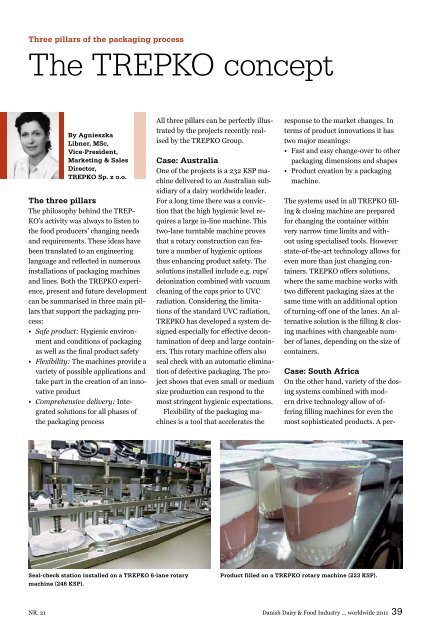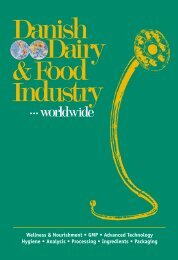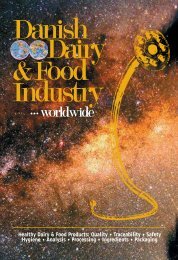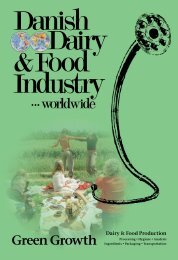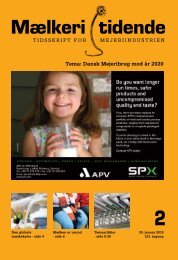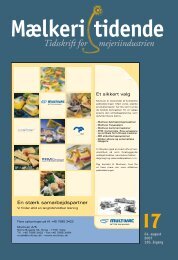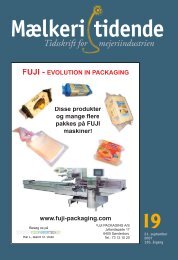Denmark - June 2011
Denmark - June 2011
Denmark - June 2011
Create successful ePaper yourself
Turn your PDF publications into a flip-book with our unique Google optimized e-Paper software.
Three pillars of the packaging process<br />
The TREPKO concept<br />
The three pillars<br />
The philosophy behind the TREP-<br />
KO’s activity was always to listen to<br />
the food producers’ changing needs<br />
and requirements. These ideas have<br />
been translated to an engineering<br />
language and reflected in numerous<br />
installations of packaging machines<br />
and lines. Both the TREPKO experience,<br />
present and future development<br />
can be summarised in three main pillars<br />
that support the packaging process:<br />
• Safe product: Hygienic environment<br />
and conditions of packaging<br />
as well as the final product safety<br />
• Flexibility: The machines provide a<br />
variety of possible applications and<br />
take part in the creation of an innovative<br />
product<br />
• Comprehensive delivery: Integrated<br />
solutions for all phases of<br />
the packaging process<br />
NR. 21<br />
By Agnieszka<br />
Libner, MSc,<br />
Vice-President,<br />
Marketing & Sales<br />
Director,<br />
TREPKO Sp. z o.o.<br />
Seal-check station installed on a TREPKO 6-lane rotary<br />
machine (246 KSP).<br />
All three pillars can be perfectly illustrated<br />
by the projects recently realised<br />
by the TREPKO Group.<br />
Case: Australia<br />
One of the projects is a 232 KSP machine<br />
delivered to an Australian subsidiary<br />
of a dairy worldwide leader.<br />
For a long time there was a conviction<br />
that the high hygienic level requires<br />
a large in-line machine. This<br />
two-lane turntable machine proves<br />
that a rotary construction can feature<br />
a number of hygienic options<br />
thus enhancing product safety. The<br />
solutions installed include e.g. cups’<br />
deionization combined with vacuum<br />
cleaning of the cups prior to UVC<br />
radiation. Considering the limitations<br />
of the standard UVC radiation,<br />
TREPKO has developed a system designed<br />
especially for effective decontamination<br />
of deep and large containers.<br />
This rotary machine offers also<br />
seal check with an automatic elimination<br />
of defective packaging. The project<br />
shows that even small or medium<br />
size production can respond to the<br />
most stringent hygienic expectations.<br />
Flexibility of the packaging machines<br />
is a tool that accelerates the<br />
response to the market changes. In<br />
terms of product innovations it has<br />
two major meanings:<br />
• Fast and easy change-over to other<br />
packaging dimensions and shapes<br />
• Product creation by a packaging<br />
machine.<br />
The systems used in all TREPKO filling<br />
& closing machine are prepared<br />
for changing the container within<br />
very narrow time limits and without<br />
using specialised tools. However<br />
state-of-the-art technology allows for<br />
even more than just changing containers.<br />
TREPKO offers solutions,<br />
where the same machine works with<br />
two different packaging sizes at the<br />
same time with an additional option<br />
of turning-off one of the lanes. An alternative<br />
solution is the filling & closing<br />
machines with changeable number<br />
of lanes, depending on the size of<br />
containers.<br />
Case: South Africa<br />
On the other hand, variety of the dosing<br />
systems combined with modern<br />
drive technology allow of offering<br />
filling machines for even the<br />
most sophisticated products. A per-<br />
Product filled on a TREPKO rotary machine (223 KSP).<br />
Danish Dairy & Food Industry … worldwide <strong>2011</strong> 39


